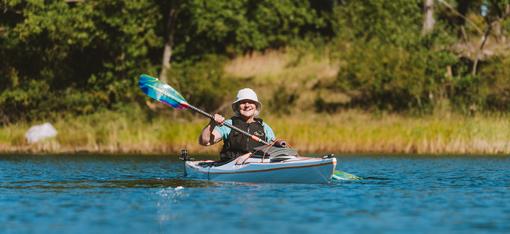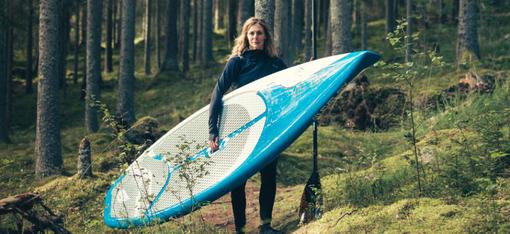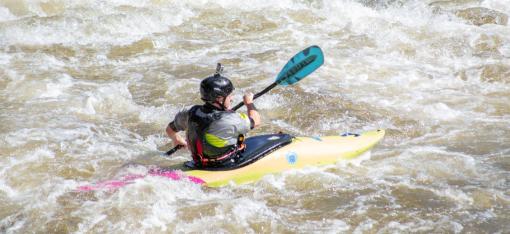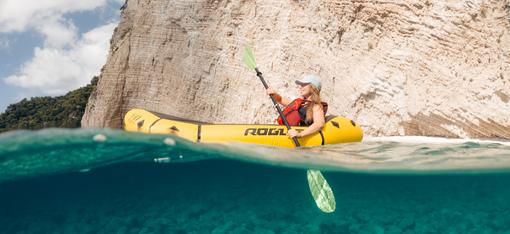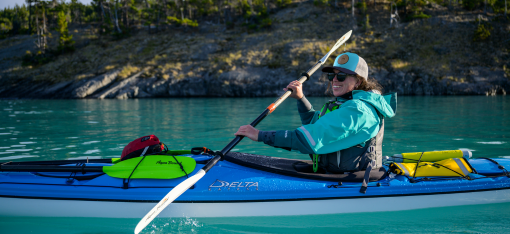Why I Sea Kayak
6-minute read
By Nick Ray
International Mental Health Awareness Month is drawing to a close. Here in the northern hemisphere, especially here in Scotland, the promise of Spring is being replaced by the certainty of Summer, and the happy warmth this brings. I’m a sea kayaker and I also live with chronic treatment resistant clinical depression. I’m also a suicide attempt survivor. Recently I was honored to be accepted as a member of the Aqua Bound Ambassador Team, and this prompted me to write a blog post about the importance of kayaking in my recovery from enduring mental illness.
 One of the many beautiful sunsets Nick has captured from his kayak
One of the many beautiful sunsets Nick has captured from his kayak
For a start, the fact I’ve been recognized by Aqua Bound as a paddler worthy of their trust is hugely important to me. As humans, recognition for who we are and what we have to offer, is a fundamental drive within us. It’s crucially important this need for being noticed and accepted for who we truly are, is healthily met. It’s how we value ourselves within our families, communities and our society. Being recognized in this way by Aqua Bound, is a massive boost to my self-esteem and because of this, I am grateful.
Someone once said to me, “It’s impossible to remain angry when you walk through a woodland." I think something similar is true for me; “It’s impossible for me to remain sad when I’m out in my kayak.” Without offering specific insights, it can appear simplistic to state with certainty why kayaking is good for me and my mental health. I’m confident you’ll agree as like-minded paddlers; once we’re out on the water our problems seem to drift away to be replaced with a sense of contentment and a feeling of wellbeing.
The following is how I specifically believe sea kayaking is beneficial to me and my continued, sound mental health.
Kayaking brings me into the present. Soon after launching from the shore, I notice how easily I’m drawn into the immediacy of life around me and what’s occurring in any given moment. Without effort, I become mindfully attentive to the stimuli of oceanic life, the sights, the sounds, the smells, the movement, the sensations and the associated feelings. So many times when I’ve been struggling with an episode of deep depression, the advice I always receive from my mental health case workers is to attend to my mindfulness and to bring myself into the immediacy of the present moment. By doing this, I will avoid agonizing about the past and worrying about the future. What is important is what is occurring for me at the time and the self-control I can exert within this. Kayaking then, is a certain way for me to effortlessly practice important and helpful mindfulness.
As someone who was once a psychotherapist and a wilderness therapist, I understand the innate psychological drives which when appropriately met, keep us emotionally healthy and always growing. Amongst these are the psychological needs of contact, recognition (I’ve touched on this already), incident, and stimulus.
The psychological desire for contact is usually manifested in our connection with other humans, sharing their presence and enjoying various levels of intimacy. We benefit from this through an increasing in of our senses of self and identity. We are also soothed by the healthy relationships we form. I view the relationship I enjoy with the natural world as a useful source of the fulfilment of my need for connection and contact. It’s a realm where I feel accepted and not judged. I can be myself in whatever form I may be experiencing at the time—joyful, sad, angry or distressed. I believe my relationship with nature to be a bountifully intimate one.
 Seal pokes its nose out of the water during once of Nick's sea kayaking adventures
Seal pokes its nose out of the water during once of Nick's sea kayaking adventures
The psychological drive for incident in our lives is our innate desire to experience the unusual, some excitement and maybe a sense of risk taking. If it is accepted personal growth cannot occur without some form of risk, moving from a known place of comfort to one which is unknown, then seeking a frisson of excitement is wholly natural. My experience as a sea kayaker, who predominantly paddles alone, is consistently brimming with little and big moments of excitement and a healthy sense of riskiness. This is certainly not the same as foolhardiness or recklessness. Without these moments, when my internal senses flutter for a moment or two, I don’t think I would grow in the way I do as a kayaker and as a person. It’s through these little moments of incident when on the sea, I learn the most about myself and my potential. Sometimes it might be an experience like as Mark Twain eloquently said, “I’m pleased I did it, partly because it was worth it, but chiefly because I’ll never have to do it again.” Nevertheless, despite these challenging moments, the experiences will be redolent in meaning and powerful insights.
The psychological fulfilment of stimulus can simply be performed by my immersion in the natural surroundings of the oceanic and littoral realm. Attending to our need for stimulus, is the realization of our desire to have our senses invigorated, for example the beauty of an incredible sunset, maybe the rich colors of autumnal foliage, or the reverberating booming of a restless sea on a rocky shore. Sometimes I admit to possibly experiencing overstimulation so powerful are the collective sources of sensory stimulators when I’m out in my kayak. To be overstimulated in this manner is far more preferable to me than feeling underwhelmed by a desultory film on the television.
 Moody and overcast skies form along the coastline
Moody and overcast skies form along the coastline
For me, the importance in all of this lies in transferring all I gain from my kayaking experiences to my life ashore, often when I require soothing the most. This is why I view my interaction with my kayaking realm as powerfully metaphoric. There is meaning to be found in just about every experience I encounter and I readily draw upon these metaphoric insights when I may be facing a particularly difficult challenge. For example, if I’m struggling with a severe dose of anxiety, I can take myself back to a moment in time in 2015, when I rounded the mighty Cape Wrath alone in my kayak, the far north west corner of Britain during my 1,850-mile solo journey around Scotland. With incredible clarity, I will immerse myself in the memories of that moment, recalling the wheeling cacophony of sea birds above me, the emptiness of the ocean of any form of human life and enjoying an incredible sense of solitude. I clearly recall feeling the power, yet gentleness of the rolling Atlantic swell beneath the hull of my kayak, as if the ocean were breathing, and how it expressed itself in steady whispering exhalations at the foot of the immense cliffs of the lonely headland. I remember at the time thinking, I could be an insignificant speck in the grand scheme of the awesomeness of nature. I remember though, instead, with a surge of energetic realization, how incredibly significant I felt in that moment. I was there, I was indeed alone, but I had reached that point through determination and effort, and I was alive! Reconnecting with these often-powerful memories and the learning I gained from them is always helpful for me.
 For Nick and many others, kayaking truly is a form a therapy and relaxation
For Nick and many others, kayaking truly is a form a therapy and relaxation
You see, sea kayaking is so much more to me than a pleasant past time. It is essential to me in my continual journey of recovery, from my sometimes-debilitating clinical depression. My depression may sadly never leave me, but I will not allow it to totally define who I am. Instead, it’s my relationship with myself which is important, the healthy one I nurture through my kayaking life and which determines who I believe myself to be. A sea kayaker who lives for the joy of life. A life which is enhanced by myriad moments of natural majesty, out on the sea, exploring the abundance of the intricate Scottish coastline.
If you want to read more about Nick and his journey, check out his website or connect with him on socials.
Do you have paddle questions our friendly Customer Service Team can help you with today? Contact them: 715-755-3405 • sales@aquabound.com
More for you...

